
Septimius Severus
Laodicea ad Mare 193-211 CE
AR Denarius 18mm, 2,76g
Obv. L SEPT SEV AVG IMP XI PART MAX, Laureate head right.
Rev. AEQVITATI AVG, Aequitas standing left, holding scales and cornucopiae
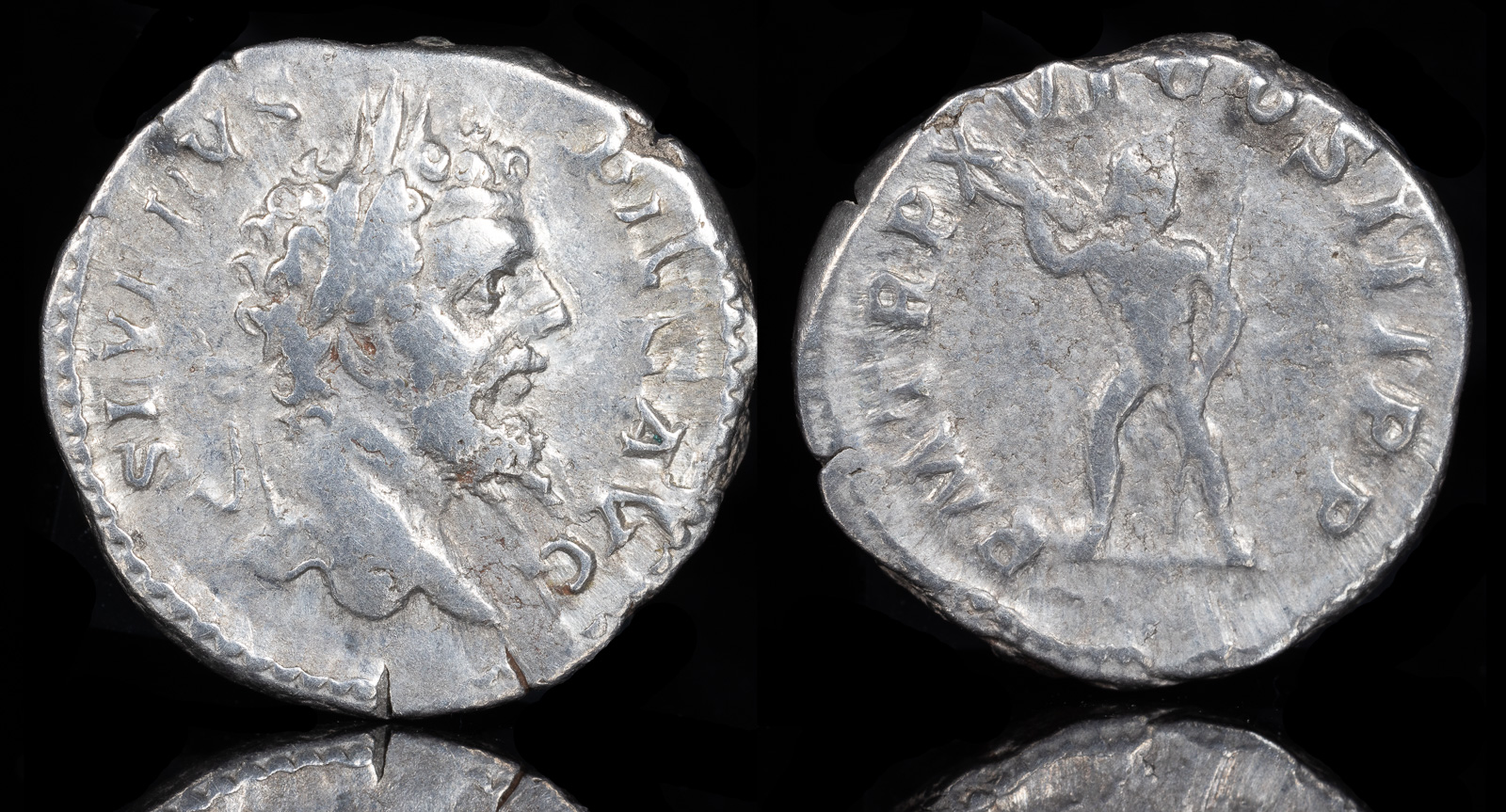
Septimius Severus 199-211 CE
Struck 208 CE
AR Denarius 19mm 3.80g
Obv: SEVERVS PIVS AVG laureate head right
Rev: P M TR P XVI COS III PP Jupiter standing right brandishing thunderbolt and holding sceptre
RIC 501 or 502 RIC IV 216
Ex Wayne G Sayles
Ex Iberico Collection
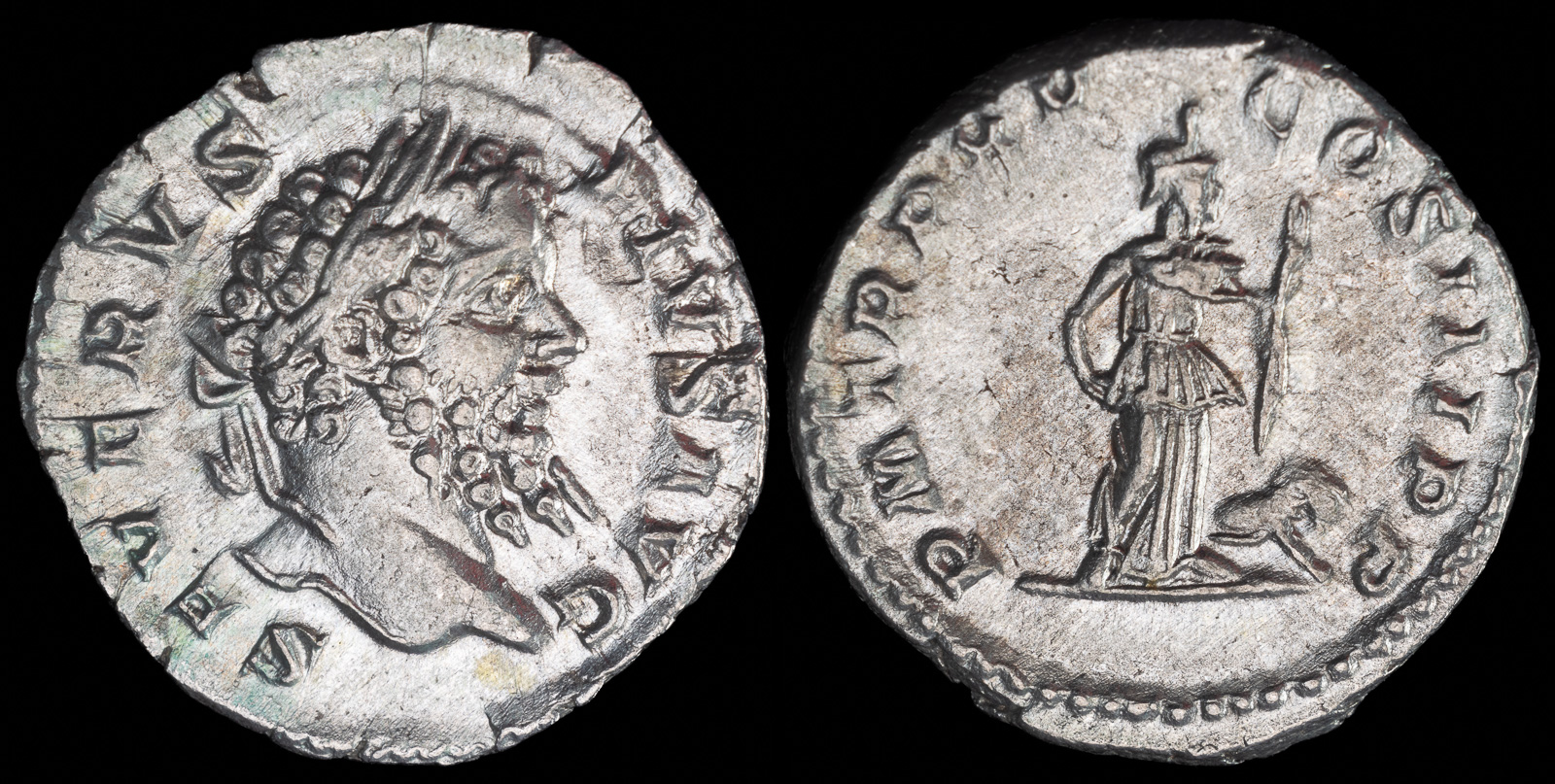
Septimius Severus
Struck 207 CE
AR Denarius 3.44g, 18mm
Lauraete bust of Septimius Severus right “SEVERVS PIVS AVG”
Africa standing right, wearing elephant headdress and holding a scepter with snake entwined around it, lion right at her feet “PM TR P XV COS III PP”
RSC 493b
One thing that immediately struck me about this coin was the personification of Africa as a woman. Today, there are roughly 1.4 billion people in Africa, so the idea of some woman introducing herself as “Africa” does seem strange. Maritz wrote a deal about this personification in an article and concluded:
-This was a specifically Roman personification and not home grown in Africa itself
-The depiction of elephant headdresses on 4th century coinage were portraits, and not area personifications
-Rome did this because they had the need to “demarcate provinces of control, and consequently specific symbols for them”.
-While a few Republican coins may depict a personification of Africa (or may be a family reference), the first definite personification was minted by Hadrian
Of course, a primary motivation for the headdress must be Alexander the Great, who was depicted in an elephant headdress on these well-known tetradrachms of Ptolemy I.
It’s currently unknown how this image morphed from Alexander the Great wearing a headdress to a female, but my belief/understanding is there was no “transformation”. The Romans felt that a woman was a better symbol of an area considered mostly under their control, and so that’s what they used.
My next question was why Septimius Severus utilized this image on his coins. There are two possible answers.
-He was the first Roman emperor born in Africa
-He launched a large campaign in Africa that expanded its southern frontier. This campaign took place from 202-203 CE.
Since this coin was minted in 207 CE, neither are great reasons. The African campaign was already finished for several years at this time, and I don’t believe it was common for emperors born outside of Italy to so prominently advertise that. To be honest, I’m not exactly sure, though there was a large issue of Denarii depicting Victory, but with no mention over whom. Perhaps there was some large victory in Africa in 207 CE that hasn’t been passed down to us in literature? In 208 CE he departed for his British campaign, but I couldn’t find mentions of what happened in 207.
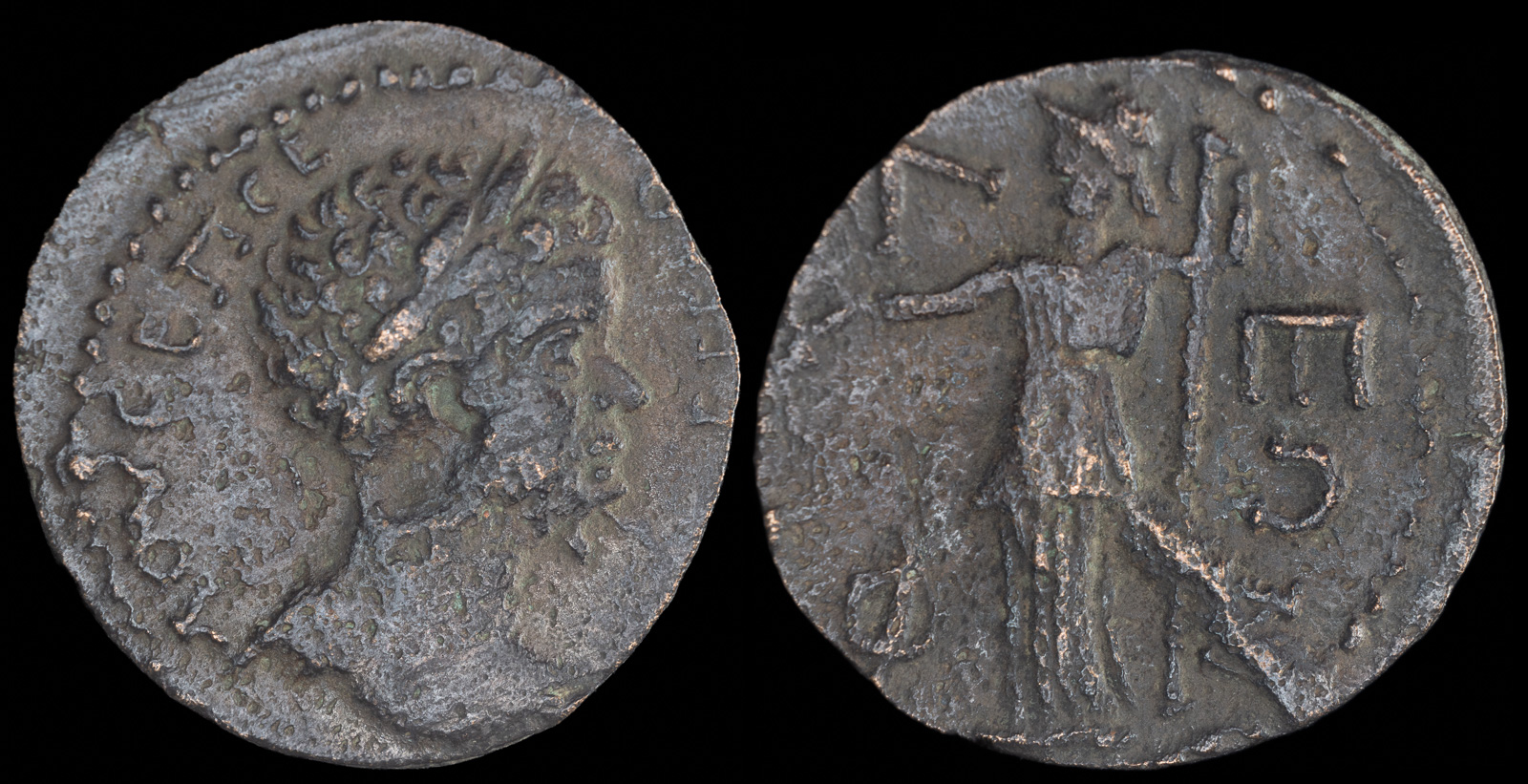
Arkadia, Phigalia
Septimius Severus 193-211 CE
Æ 22mm, 4,32g
ΛOY CЄΠ [C]ЄYHPOC ЄC (sic), laureate head right /
ΦI A ΛЄωN, Dionysus standing left, holding cantharus and thyrsus
BCD Peloponnesos 1647.1 var
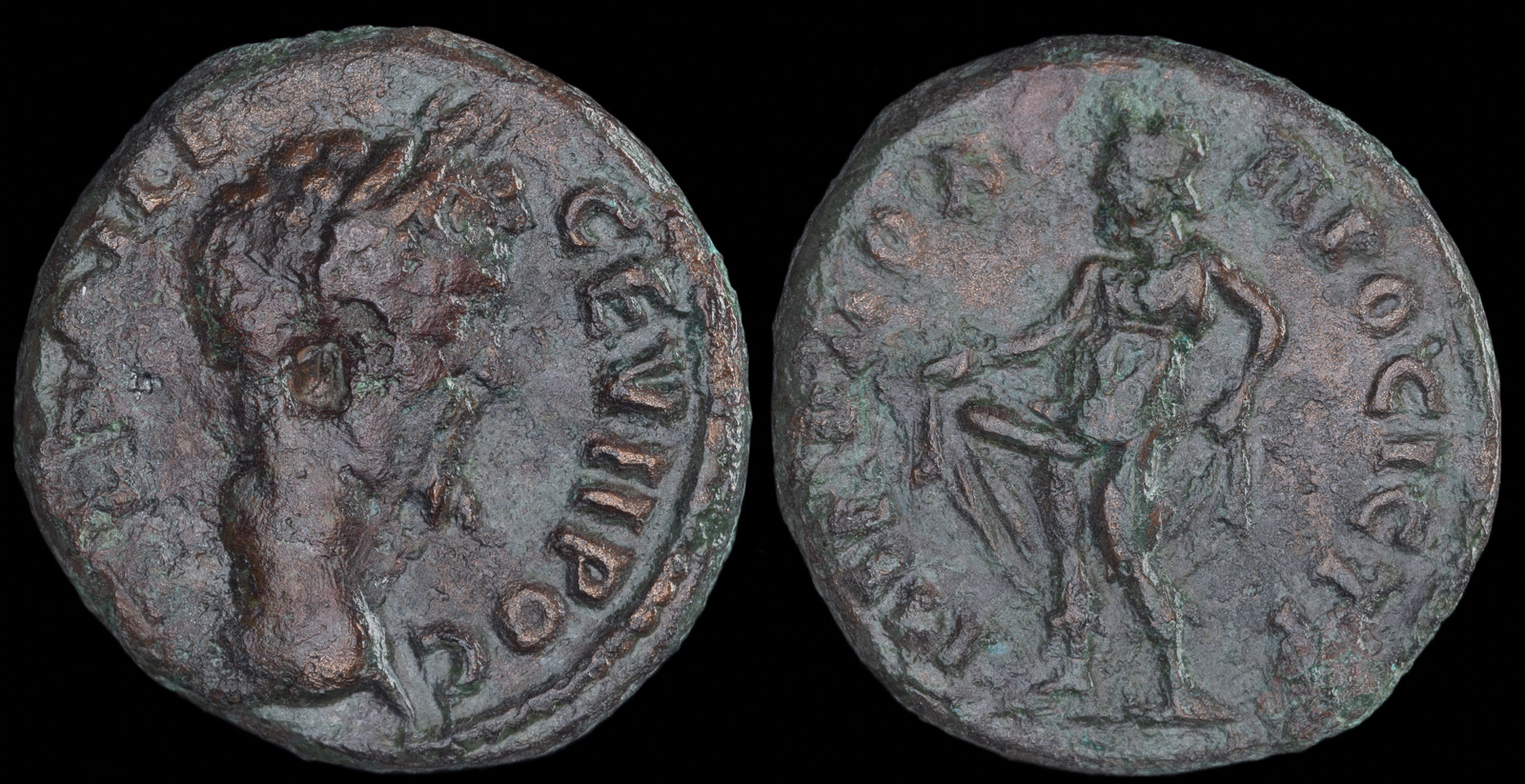
Moesia Inferior, Nikopolis ad Istrum
Septimius Severus 193-211 CE
Æ 16mm, 2,96g
Laureate head right /
Priapus standing left, opening cloak, right hand pointing to his large phallus
H&J, Nikopolis 8.14.17.2; AMNG 1380 var. (rev. legend); Varbanov 2530 var. (same)
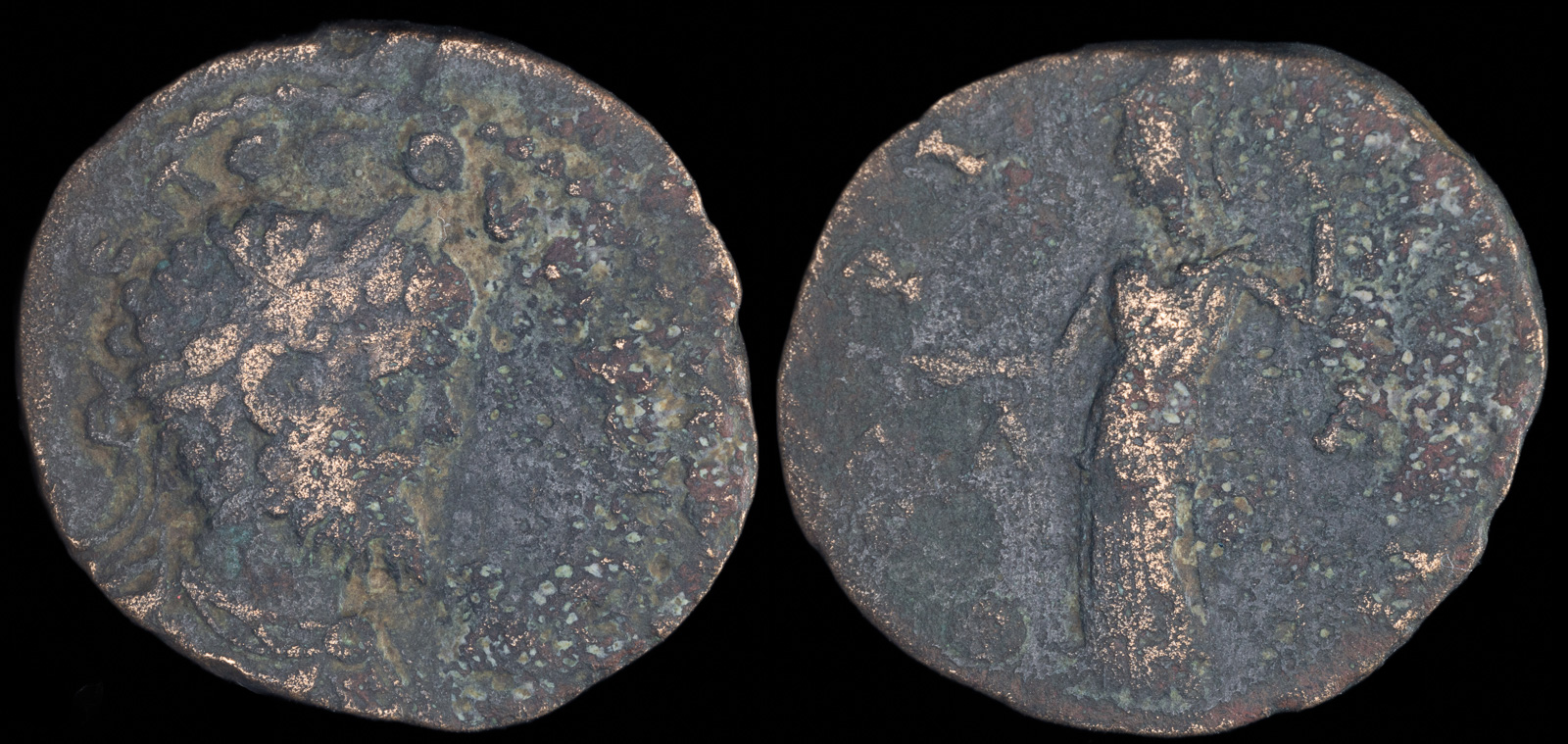
Messenia, Cyparissia (Kyparissia)
Septimius Severus 193-211 CE
Ae Assarion 21mm 5.9gms
Obv: LOY CEP CEOYHPOC; Laureate, cuirassed bust right
Rev: KYPARICCIEWN; Athena standing left holding patera and spear, shield at her side
BCD Peloponnesos 793; NCP p. 70, 2; BMC –; Imhoof-Blumer+Gardner P XVIII

Septimius Severus
Flavius Ulpianus legate
Moesia Inferior, Nicopolis ad Istrum
193-211 CE
Æ 28mm, 10.58 gm, 2h
Obv: AYT Λ CΕΠΤΙ CEYHPOC Π, Laureate, draped and cuirassed bust right, seen from behind.
Rev: V ΦΛ OVΛΠΙΑN ΝΙΚΟΠΟΛΙ ΠΡΟC I, Dionysos standing left, holding kantharos pouring wine in r. hand and ribboned thyrsos in left hand. AMNG 1333, except this example spells the city name as ΝΙΚΟΠΟΛΙ instead of ΝΙΚΟΠΟΛ.
Varbanov__; Hristova/Hoeft/Jekov (20115) 8.14.8.9 (same die, with same die break on obv.)
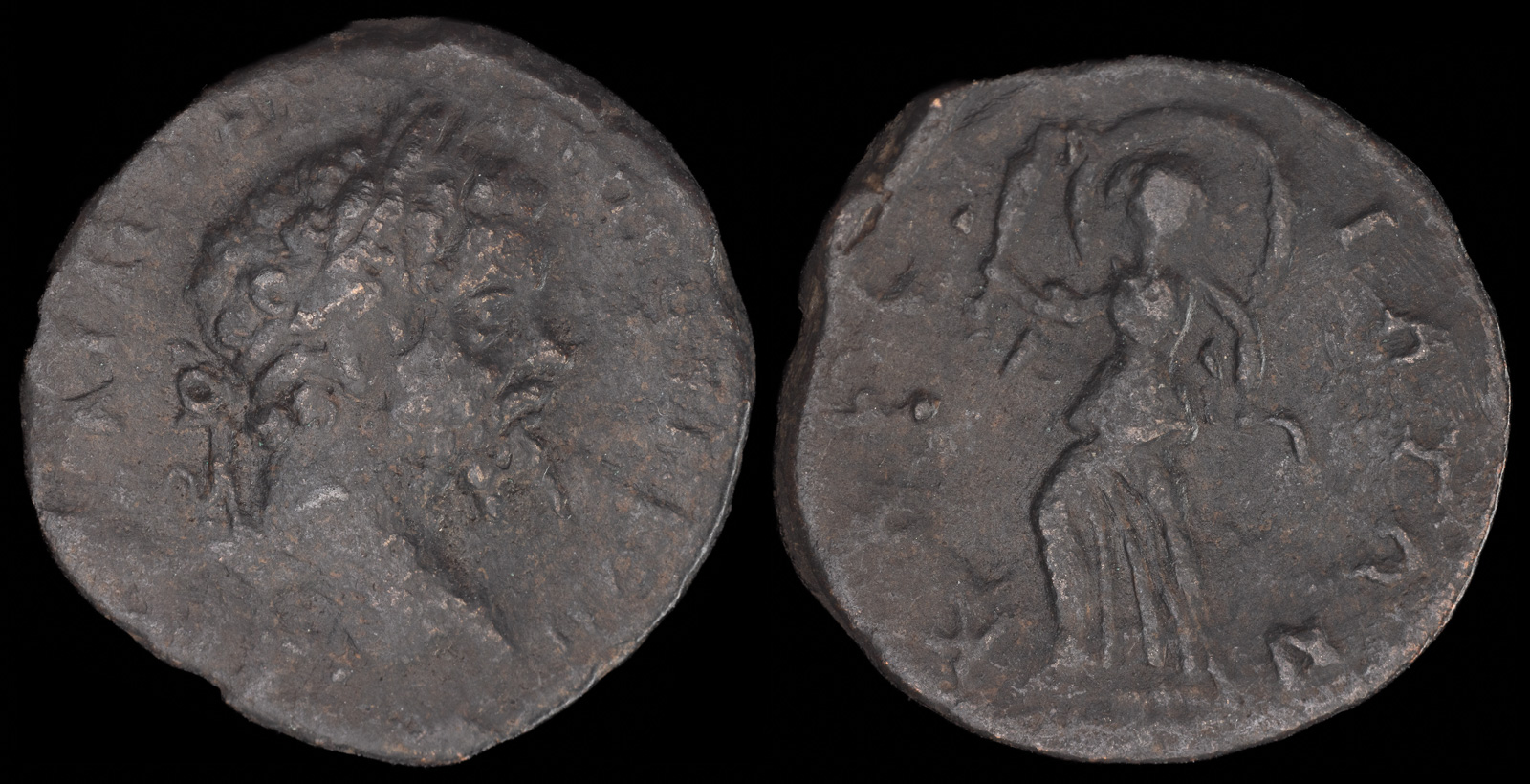
Arkadia, Kaphyai
Septimius Severus
193-211 CE
Æ 22mm, 6,30g
Head with laurel wreath right /
Artemis with torch, bow and head turned back, hurrying to the left
BCD Peloponnesos 1385
April 11
Septimius Severus is born at Leptis Magna.
Septimius Severus moves to Rome for career reasons.
With his career stunted, Septimius Severus returns to Leptis Magna.
December 5
Septimius Severus takes office as quaestor and enrolls in the Senate.
Septimius Severus serves in a high ranking military role to his cousin, the proconsul of Africa Proconsularis.
Septimius Severus serves as tribune of the people in Rome.
Septimius Severus marries Paccia Marciana from Leptis Magna.
Paccia Marciana, wife of Septimius Severus, dies.
Marriage of Septimius Severus to Julia Domna.
Septimius Severus serves as governor of Lugdunum.
April 4
Caracalla born as Lucius Septimius Bassianus to Septimius Severus and Julia Domna in Lugdunum.
March 7
Birth of Geta to Julia Domna and Septimius Severus.
Commodus appoints Septimius Severus governor of Pannonia Superior.
Emperor Septimius Severus, a native of North Africa, grants Carthage additional privileges, marking it as a prominent city within the Roman Empire.
Septimius Severus discharges the Praetorian Guard and forbids them from coming within 160km of Rome.
April 9
In response to the murder of Pertinax, troops proclaim Septimius Severus Emperor.
Clodius Albinus shares the consulship with Septimius Severus.
Septimius Severus crushes the forces of Pescennius Niger at the Battle of Issus.
Byzantion sides with Pescennius Niger over Septimius Severus, Roman forces besiege the city and cause considerable damage.
October
Septimius Severus installs Caracalla as his successor and has the Senate declare Clodius Albinus an enemy.
Septimius Severus sails to Aigai in preparation for a Parthian campaign.
February 19
Septimius Severus defeats Clodius Albinus at the Battle of Lugdunum. Clodius Albinus kills himself. Septimius Severus becomes sole Emperor, and Julia Domna becomes Empress.
Septimius Severus sacks the Parthian capital of Ktesiphon.
Septimius Severus fails to take Hatra after two lengthy sieges.
Septimius Severus and Caracalla thank Nicopolis ad Istrum for celebrating a festival and sending money.
Caracalla serves as Roman consul with his father, Septimius Severus.
Septimius Severus launches a military campaign in Africa.
Septimius Severus significantly enlarges Rome’s territory in Africa.
January
The Praetorian prefect Plautianus is executed by Septimius Severus after allegation of a conspiracy by Julia Domna and Caracalla.
Septimius Severus travels to Britain in order to conquer Scotland.
Septimius Severus leads his army into the north of Britain. He takes heavy casualties from guerilla warfare, but also massacres many locals.
Caracalla leads an expedition north of the Antonine Wall to destroy everything on the other side on behalf of Septimius Severus.
February 4
Septimius Severus dies at Eboracum while on campaign in the north of Britain. Caracalla and Geta become co-emperors with Julia Domna mediating between them.
Septimius Severus devalues the Denarius.